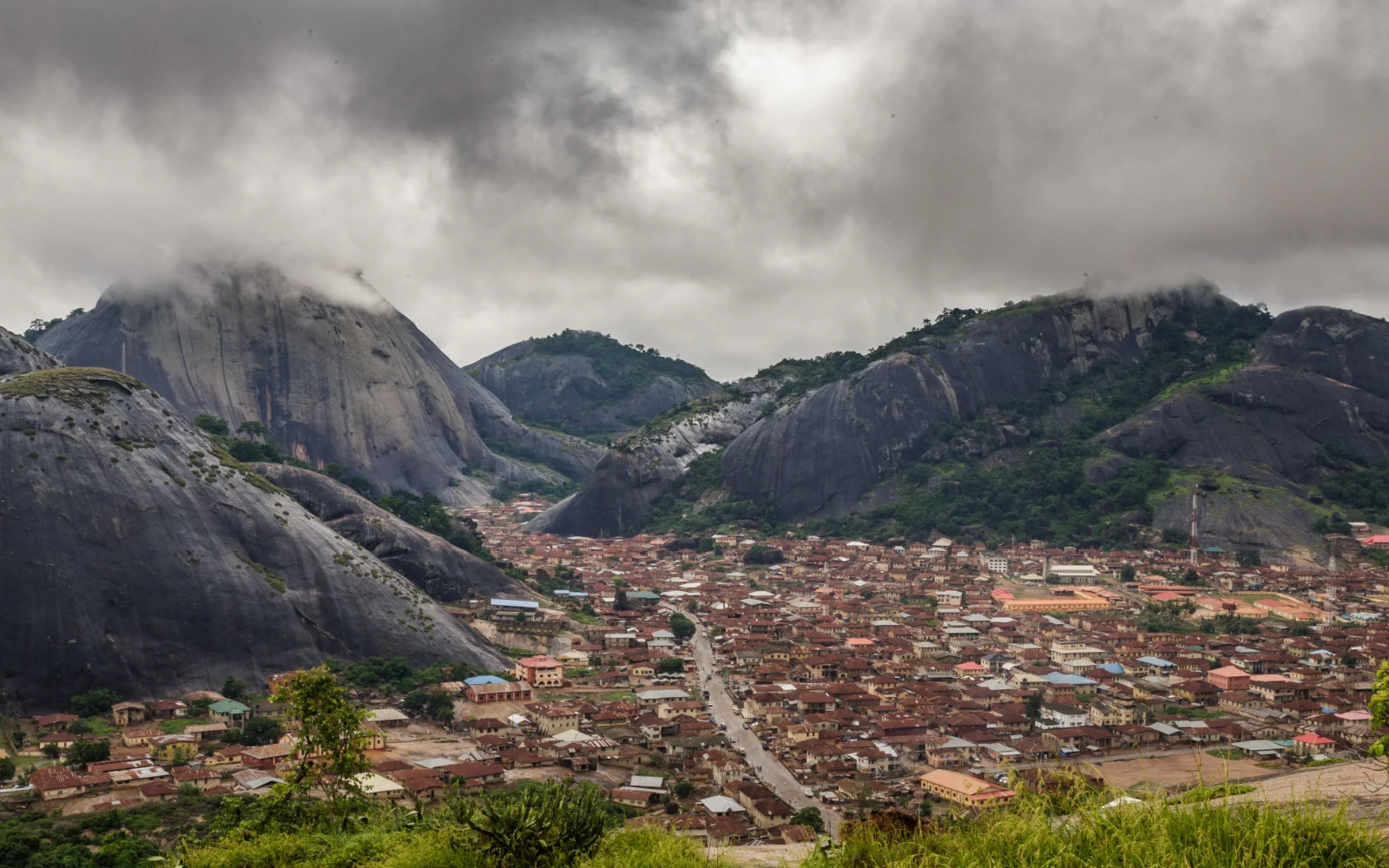Nigeria, West Africa’s most populous country, is one of the best places to go if you want an authentic African experience. You can join the approximately 5 million other visitors to Nigeria each year.
The primary draw for most people when visiting Nigeria are the vibrant cities such as Lagos where you can check out contemporary art at Nike Art Gallery and other places, explore the thumping nightlife, and buy local arts and crafts at the markets.
Nigeria also has natural beauty such as the Ikogosi Warm Springs or the wetlands at Lekki Conservation Center. However, before visiting any country, you probably want to know about the safety situation.
Nigeria does have a reputation for being a bit overwhelming for foreign visitors, but it’s worth unpacking how much the reputation has to do with reality.
But don’t worry — or travel experts have done the hard work for you. Below, we’ll thoroughly explore the safety concerns for Nigeria with the goal of helping you plan for your trip. Let us be your guide!
Is Nigeria Safe to Visit in 2026?
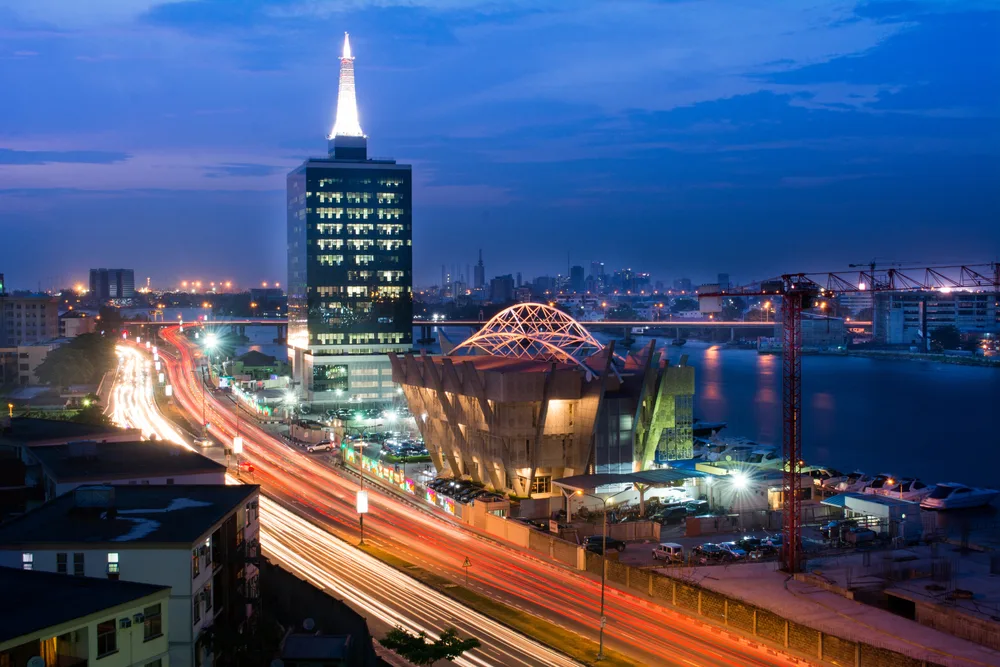
Victoria Island, Lagos / Lagos – June 23 2018: Landscape view of the street at dusk/ba55ey/Shutterstock
Nigeria is going through a tough time in terms of its security situation, and some parts of the country are not safe to visit due to the risk of terrorism and armed violence.
The entire country has an elevated risk of crime. You can still visit Nigeria but be prepared that you will have to be on your guard the entire time you are there. Most countries have elevated travel warnings for Nigeria.
For example, the United States tells citizens and government employees to reconsider travel to Nigeria, the Level 3 warning in the country’s alert system.
The United States and many other countries tell their citizens to avoid certain regions altogether. The main reason most countries give for reconsidering travel to Nigeria is the elevated crime rate.
Unfortunately, the country experiences a lot of violent crime, including:
- Piracy
- Maritime crime
- Kidnapping
- Armed robbery
- Carjacking
- Banditry
- Assault
- Sexual assault
- Terrorism
As you can see, the list certainly goes on and on. Embassies located in Nigeria and local news also report increasing crime and a deteriorating situation.
The country is also undergoing simmering civil unrest and even separatist conflicts in some regions. There are a few reasons why the security situation is so tenuous.
Nigeria is a large country with hundreds of ethnic groups, some of which feel neglected by the central Nigerian state, making them turn to alternative authorities such as separatists.
The Biafra separatist rebellion has been running for decades in the south, while the north of the country has a strong insurgency and Islamic terrorist presence. There are a few other factors that make Nigeria feel like such a powder keg sometimes.
Nigeria has a high level of political repression, and ACLED reports that over 9,900 people died in 2021 due to organized violence during political events.
Nigeria is in the midst of an election cycle right now as elections were held in early 2023, and the US embassy in the country issued a statement condemning voter suppression and other violence that occurred.
Post-election protests are likely. Economic instability is another driving factor behind the growing volatility of Nigeria’s security situation.
The Canadian government warned that there have been violent incidents around banks and ATMs due to the Central Bank of Nigeria’s reissuing of Naira notes.
Most of these problems affect locals and visitors are rarely targeted during incidents of political violence or civil unrest, but it is still easy to get caught in the crossfire.
When traveling to Nigeria, make sure that you stay alert at all times and follow local news to figure out if you need to change your plans and leave immediately.
Crime in Nigeria
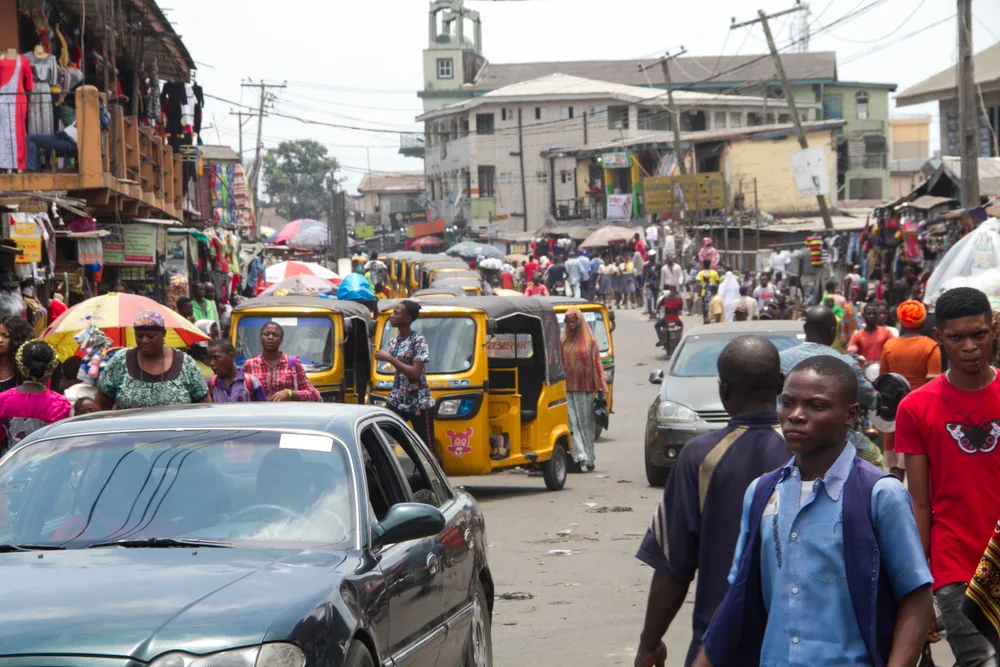
Ajegunle City, Lagos State Nigeria March 22, 2018: Busy Streets bustling with commercial activity/Tayvay/Shutterstock
Crime is a definite cause for concern when visiting Nigeria due to high levels not just of overall crime, but of violent crime. Looking at statistics from 2017, there were 53,641 violent crime incidents, or 39.8% of the crime totals.
Since then, violent crime rates have increased, prompting many governments around the world to reevaluate their travel advisories for Nigeria.
To see the dire state of security in Nigeria, all we have to do is look at indicators for the most violent of violent crimes, homicide. According to the World Bank, Nigeria’s intentional homicide rate was a whopping 22 incidents per 100,000 people, well above the global average.
That makes Nigeria the country with the 10th highest homicide rate in the world. While most homicides in Nigeria are the result of terrorist attacks or targeted gang violence, therefore not affecting visitors, it still is cause for concern.
Levels of other crimes besides homicide are also very high. According to Numbeo, Nigeria scores a 71.17 out of 100 on the crime index, meaning that it has a high rate of crime.
Respondents report high levels of all types of crime, including break-ins, muggings, vehicle thefts, assault, and violent crimes. The most troubling crime according to respondents was corruption and bribery.
There are a few reasons why Nigeria’s crime rate is so high. The prevalence of organized crime is certainly a problem. According to the Global Organized Crime Index, Nigeria is 5th in the world in terms of the prevalence of organized crime.
These groups are behind heinous crimes including international human trafficking networks, trafficking small arms, illegally poaching protected animals such as lions, and sourcing and transporting drugs.
Organized crime groups are also behind many other crimes such as banditry, carjacking, kidnapping, money laundering, oil bunkering and so much more.
Nigeria’s fragile security situation enables these organized crime networks. The state has very little control over border areas, making it easy for groups to engage in international crimes.
The prolific arms trade means that any criminal that wants a gun, can get a gun with which to do crimes. Finally, the Nigerian state is highly corrupt, and many officials that should be prosecuting crime actually closely collaborate with criminals.
Kidnapping
All sorts of violent crime are prevalent in Nigeria, including rape, armed robbery, carjacking, and even piracy in the Gulf of Guinea. However, the one that foreign governments warn about the most because it is the crime for which foreigners are targeted the most is kidnapping.
The New Zealand government warns about the prevalence of kidnapping, which can affect locals, dual nationals, expats, and foreign visitors.
Although kidnapping is more prevalent in certain regions of Nigeria such as the North, Northeast, and Niger Delta, it can happen anywhere in the country. Pirates sometimes kidnap people at sea in the Gulf of Guinea.
Kidnappers often target people they believe will have money, such as Nigerians living abroad, workers in the oil industry in the Niger Delta, and humanitarian workers.
Bandit and kidnapping groups often lay in wait on the roads and wait for potential victims, so be especially careful when traveling around Nigeria.
The United States government warns about the prevalence of kidnapping on interstate roads and advises citizens to take precautions, for example avoiding driving at night. Kidnappers often try to ransom their hostages as that is the point of their racket.
However, there have been situations of kidnappers killing their victims before. Sometimes, terrorist groups such as Boko Haram are the ones carrying out kidnapping.
As a result, they are more likely to kill a hostage to prove a point for their ideology. If you happen to be the victim of an armed robbery or carjacking, hand over your valuables and focus on getting away as soon as possible.
Sometimes, these crimes escalate into kidnapping attempts, and you want to lower your risk of such a thing happening if at all possible.
Terrorism
Nigeria is home to one of the world’s terrorist hotspots. Northern Nigeria in particular is a hotbed for terrorism, including a growing Islamist insurgency.
The strongest terrorist group in Nigeria is Boko Haram, which has been around since the 1990s but increased dramatically in capacity since the 2010s.
Not only does the group carry out frequent bombing attacks throughout Nigeria, including against Western interests, but it is also behind mass kidnappings such as the targeting of schoolgirls in 2014, attacks in neighboring countries, and more.
Boko Haram and other terrorist groups have displaced several million people from the north of Nigeria and according to the Australian government, have killed over 10,000 people over the past decade.
Boko Haram is not the only terrorist group active in Nigeria. The Islamic State West Africa Province is actually more active than Boko Haram and geographically dispersed throughout Nigeria. There are also smaller, localized bandit groups that operate similarly to terrorists.
The UK government warns that terrorist groups are likely to strike anywhere in Nigeria. Likely targets include public places such as shopping malls, religious buildings, camps for displaced people, and transportation hubs.
Terrorists also target government buildings and other places affiliated with authority, such as schools, international organization offices, and even foreign embassies.
Terrorist groups can strike in major cities, small towns, and even on the road as they are often behind roadblocks. There is no way to fully protect yourself from the possibility of a terrorist attack.
You can minimize your risk by avoiding large public gatherings, especially political or religious festivals, always having an exit plan, and staying on top of local news. However, you can never eliminate the risk entirely since terrorism is by definition unpredictable.
Avoiding Bad Areas
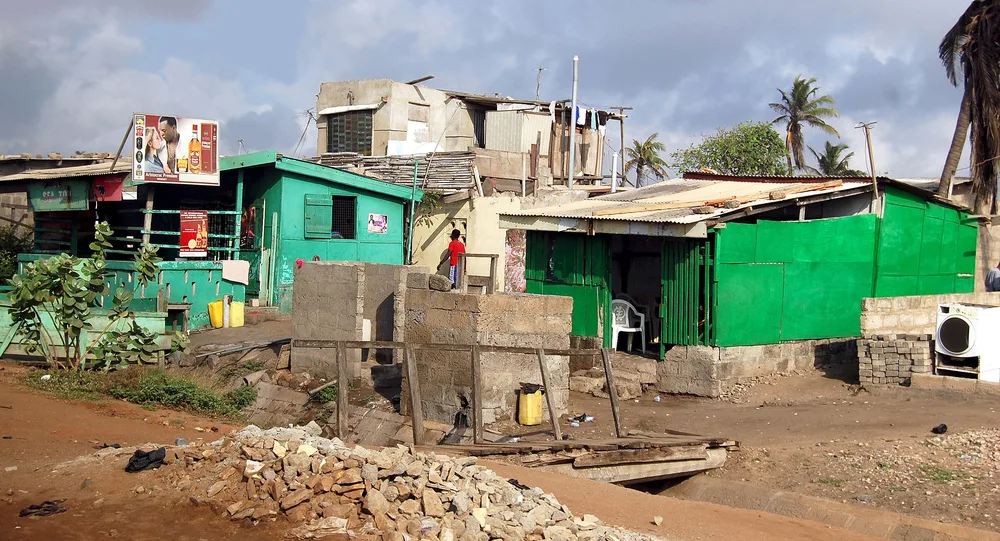
Problems of poverty in developing countries of Africa. Closely spaced houses in a residential area of Accra. Low quality of life and poor housing conditions. Accra, Ghana – September 17, 2013/Nataly Reinch/Shutterstock
Certain parts of Nigeria are not safe for any form of travel. Do not travel to states in the northeast and northwest, including:
- Borno
- Yobe
- Adamawa
- Gombe
- Kaduna
- Katsina
- Zamfara
These states have very high rates of banditry and kidnapping. States in the northeast such as Borno, Yobe, Adamawa and Gombe are hotbeds of Boko Haram activity.
You should also avoid all travel to states in the Niger Delta area, such as:
- Delta
- Bayelsa
- Akwa Ibom
- Rivers
- Cross River
- Anambra
These states have a very high risk of armed militancy, kidnapping, and targeted assault.
Things to Consider
Here are some other things to keep in mind when you go to Nigeria:
- Roads are frequent targets for kidnappers, terrorists, and banditry. If you come upon a roadblock, try to avoid it. If you can’t, cooperate with the demands of whoever is operating it. Travel with a convoy or avoid traveling on roads that are known hotspots.
- Nigeria’s cities such as Lagos and Abuja have high levels of crime, from petty to violent crime. To minimize your risk of violent crime, avoid going out at night and travel with a reputable taxi if you are checking out the nightlife.
- Credit card fraud is common in Nigeria, so many businesses do not accept credit cards. Carry one card and just enough cash for the day when you are out and about to avoid being a target for robbers.
Frequently Asked Questions
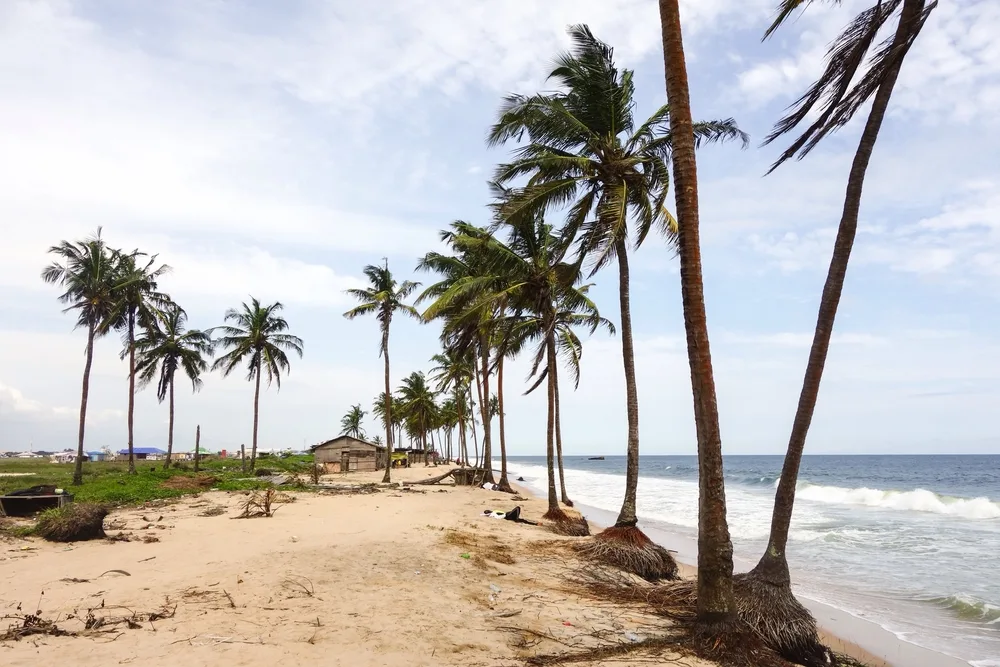
Bill Kret/Shutterstock
Here are some common questions you may want to also know before traveling to Nigeria:
Are foreigners safe in Nigeria?
Foreigners are not safe in Nigeria due to the very high level of crime. However, they are no less safe than locals, who are also affected by the same problems.
Is Lagos Nigeria safe for tourists?
Lagos is one of the safer parts of Nigeria because it has low rates of separatist or terrorist violence. However, it has a very high crime rate, including petty theft that often targets foreigners, so keep that in mind before visiting.
Where is the safest place in Nigeria?
The Nigerian cities with the lowest crime rates include Benin, Akure, and Calabar. The states with the least unrest include Osun, Enugu, and Lagos states. However, keep in mind that “safe” is relative and that what Nigerians might consider safe may still be difficult for you to adjust to.
Is Lagos Nigeria worth visiting?
Lagos is absolutely worth visiting. This is the best place to visit if you want a glimpse at Nigerian culture as it is home to the country’s thriving art, music, and fashion scene.
So, Is Nigeria Safe to Visit?
A visit to Nigeria is full of challenges as the country is dealing with a deteriorating security situation, and visitors are at risk of getting caught up in terrorist attacks, civil unrest, or a criminal attack.
However, for experienced travelers who know what precautions to take, a trip to Nigeria can still be rewarding. Regardless, we don’t suggest visiting, especially with so many other amazing (and safe) places to visit in Africa. Check them out here!



